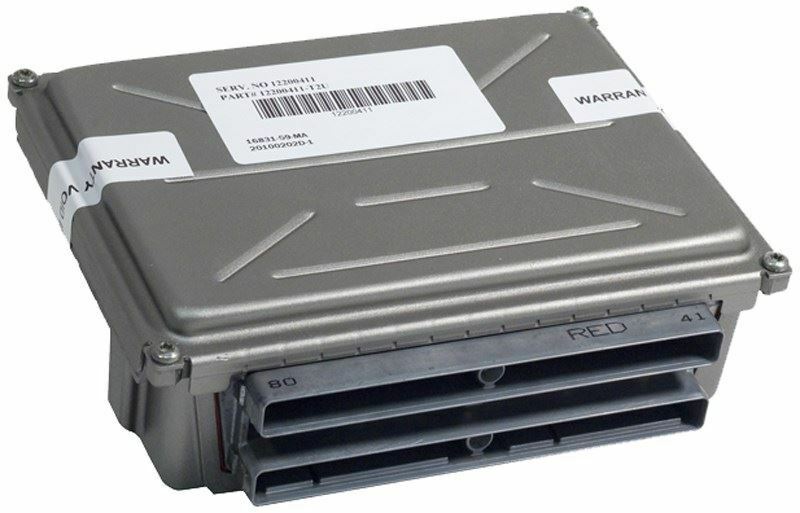Is Your 2003 GMC Safari Running Rough? The PCM Might Be the Culprit.
As the central command center for your vehicle’s engine and transmission, the Powertrain Control Module (PCM) is arguably one of the most critical components in your 2003 GMC Safari. When it begins to fail, it can create a cascade of confusing and frustrating problems, from a persistent Check Engine Light to a vehicle that refuses to start. Symptoms can often mimic other issues, leading to costly and incorrect repairs. If you’re experiencing erratic performance, poor fuel economy, or shifting problems, it’s time to consider the brain of your operation: the PCM.
Common Symptoms of a Failing 2003 GMC Safari PCM
A faulty PCM can manifest in numerous ways. If you’re noticing any of the following issues, a failing module could be the root cause. Keep an eye out for these tell-tale signs:
- ✔ Persistent Check Engine Light: The light stays on, and you may find communication-related diagnostic trouble codes (DTCs), such as U-codes, or codes for multiple unrelated sensors.
- ✔ Engine Performance Problems: This includes unexplained stalling, rough idling, hesitation during acceleration, or a general lack of power.
- ✔ Poor Fuel Economy: A sudden and significant drop in your miles per gallon (MPG) can indicate the PCM is not managing the fuel mixture correctly.
- ✔ Erratic Transmission Shifting: The PCM controls shift points. A faulty module can cause harsh shifting, delayed engagement, or getting stuck in one gear.
- ✔ No-Start Condition: The engine may crank but refuse to start. This can happen if the PCM is not properly controlling the fuel injectors or ignition coils.
- ✔ Intermittent Electrical Issues: Because the PCM communicates with other modules, its failure can sometimes cause strange behavior in gauges or other electronic systems.
From the Diagnostic Bay
I once had a 2003 Astro van (which uses the same platform as the Safari) come into the shop with a classic complaint: it was running terribly and had been through three different mechanics. The owner had replaced the MAF sensor, multiple O2 sensors, and even the fuel pump based on various codes. The problem was, the issues would return within a week. When we hooked up our professional scan tool, we noticed the live data from the sensors was erratic and nonsensical. The PCM wasn’t just failing to interpret data; its internal voltage regulation was shot, and it was actually damaging the new sensors being installed. We replaced the PCM with a correctly programmed unit, and the van ran perfectly. It’s a classic case of treating the disease, not just the symptoms.
The Direct-Fit Solution: Pre-Programmed PCM 12581565
This isn’t just a replacement part; it’s a complete, ready-to-install solution for your vehicle. This Powertrain Control Module, service number 12581565, is meticulously programmed to your vehicle’s specific Vehicle Identification Number (VIN) before it ships. This critical step ensures that the module is loaded with the latest GM software updates and is perfectly matched to your van’s unique configuration, including its engine, transmission, and factory options. This eliminates the need for an expensive trip to the dealership for programming.
Why VIN-Specific Programming is Essential
A PCM from another vehicle, even an identical model, will not work correctly in yours without proper programming. The VIN tells the module everything it needs to know to communicate with the other systems in your GMC Safari. This includes anti-theft systems (like GM’s Passlock), transmission type, emissions equipment, and engine parameters. Our process ensures a seamless integration, restoring your vehicle to its original factory performance and specifications. By providing us with your VIN upon purchase, you guarantee a component that is truly plug-and-play.
Installation and Getting Back on the Road
For the 2003 GMC Safari, the PCM is typically located on the driver’s side, by the battery. Physical installation is straightforward:
- Disconnect the Battery: Always disconnect the negative battery terminal before working on any electronic components.
- Access the PCM: Locate the module and carefully disconnect the wiring harnesses. Pay attention to the locking tabs to avoid damage.
- Swap the Modules: Remove the mounting bolts, take out the old PCM, and install the new one in its place.
- Reconnect Everything: Securely reconnect the wiring harnesses and the negative battery terminal.
In many cases, after installation, you may need to perform a simple security relearn procedure, which can typically be done without any special tools. This often involves cycling the key in the ignition and allows the new PCM to synchronize with your vehicle’s anti-theft system.
Frequently Asked Questions
Do I need to take this part to a dealer for programming?
No. We handle all the programming for you before the part is shipped. Simply provide us with your vehicle’s VIN during or after checkout, and it will arrive ready to install.
Where can I find my VIN?
Your 17-digit Vehicle Identification Number (VIN) can be found on the driver’s side of the dashboard (visible through the windshield), on the driver’s side door jamb sticker, or on your vehicle’s registration and insurance documents.
Is this part difficult to install myself?
The physical installation is generally simple for someone with basic mechanical skills, involving only a few bolts and electrical connectors. However, you must disconnect the battery first. Some vehicles may require a security relearn procedure, which is a simple process you can do at home.
What happens if I install it without it being programmed to my VIN?
An unprogrammed or incorrectly programmed PCM will not allow your vehicle to start and run correctly. It will not be able to communicate with the other modules in your vehicle. That is why we require your VIN to ensure functionality.
Will this fix my check engine light?
If the check engine light and associated codes are being caused by a faulty PCM, then yes, this part will resolve the issue. We recommend clearing all diagnostic trouble codes with a scan tool after installation.
Is this compatible with other vehicles?
Yes, this module fits a wide range of GM trucks, vans, and even some cars from the era, including the Chevy Astro, Express, Silverado, GMC Savana, Sierra, and Cadillac CTS. Please verify the part number and your vehicle’s options in our fitment list.


